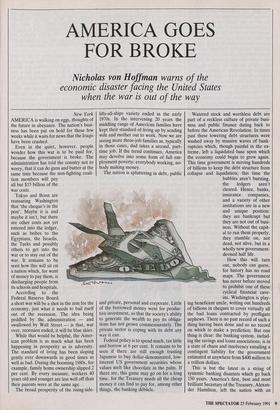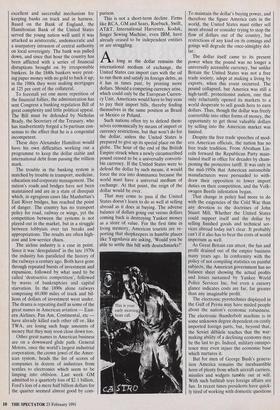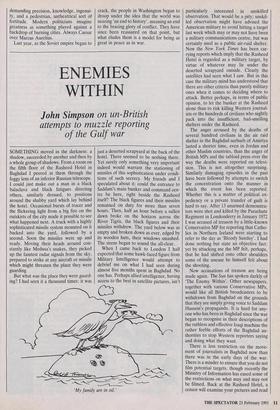AMERICA GOES FOR BROKE
Nicholas von Hoffman warns of the
economic disaster facing the United States when the war is out of the way
New York AMERICA is walking on eggs, thoughts of the future in abeyance. The nation's busi- ness has been put on hold for these few weeks while it waits for news that the Iraqis have been crushed.
Even in the quiet, however, people wonder how this war is to be paid for, because the government is broke. The administration has told the country not to worry, that it can do guns and butter at the same time because the non-fighting coali- tion members will pay all but $15 billion of the war costs.
Tokyo and Bonn are reassuring Washington that 'the cheque's in the post'. Maybe it is and maybe it isn't, but there are other costs not yet entered into the ledger, such as bribes to the Egyptians, the Israelis, the Turks and possibly others to get into the war or to stay out of the war. It remains to be seen how this will sit on a nation which, for want of money to pay them, is discharging people from its schools and hospitals.
According to the Federal Reserve Board a short war will be a shot in the arm for the economy, just what it needs to bail itself out of the recession. The idea being peddled by the administration — and swallowed by Wall Street — is that, war over, recession ended, it will be blue skies.
While that would be helpful, the Amer- ican problem is as much what has been happening in prosperity as in adversity. The standard of living has been sloping gently ever downwards in good times as well as bad. During the booming 1980s, for example, family home ownership slipped 2 per cent. By every measure, workers 40 years old and younger are less well off than their parents were at the same age.
The broad prosperity of the rising-tide- lifts-all-ships variety ended in the early 1970s. In the intervening 20 years the middling range of American families have kept their standard of living up by sending wife and mother out to work. Now we are seeing more three-job families as, typically in those cases, dad takes a second, part- time job. If the trend continues, America may devolve into some form of full em- ployment poverty: everybody working, no- body making money.
The nation is spluttering in debt, public and private, personal and corporate. Little of the borrowed money went for produc- tive investment, so that the society's ability to generate the wealth to pay its obliga- tions has not grown commensurately. The private sector is coping with its debt any way it can.
Federal policy is to spend much, tax little and borrow at 6 per cent. It remains to be seen if there are still enough trusting Japanese to buy dollar-denominated, low- interest US government securities whose values melt like chocolate in the palm. If there are, this game may go on for a long time, for the Treasury needs all the cheap money it can find to pay for, among other things, the banking debacle. Watered stock and worthless debt are part of a reckless culture of private busi- ness and public finance dating back to before the American Revolution. In times past these towering debt structures were washed away by massive waves Of bank- ruptcies which, though painful in the ex- treme, left a liquidated base upon which the economy could begin to grow again. This time government is moving hundreds of billions to keep the debt structure from collapse and liquidation; this time the bubbles aren't bursting, the ledgers aren't cleared. Hence, banks, insurance companies, and a variety of other institutions are in a new and unique position: they are bankrupt but they are not out of busi- ness. Without the capit- al to run them properly, they stumble on, not dead, not alive, but in a wholly new government- devised half life.
How this will turn out, nobody can guess, for history has no road maps. The government has never before moved to prohibit one of these cyclical financial cave- ins. Washington is play- ing beneficent uncle, writing out hundreds of billions in cheques to cover virtually all the bad loans contracted by profligate nephews. There is no past record of such a thing having been done and so no record on which to make a prediction. But one thing is clear: the banking system, includ- ing the savings and loans associations, is in a state of chaos and insolvency entailing a contingent liability for the government estimated at anywhere from $400 million to a trillion dollars.
This is but the latest in a string of systemic banking disasters which go back 150 years. America's first, best and most brilliant Secretary of the Treasury, Alexan- der Hamilton, left the nation with an excellent and successful mechanism for keeping banks on track and in harness. Based on the Bank of England, the Hamiltonian Bank of the United States served the young nation well until it was attacked as aristocratic, undemocratic and a usurpatory intrusion of central authority on local sovereignty. The bank was pulled down, and since that hour the country has been afflicted with a series of financial disruptions brought on by irresponsible bankers. In the 1840s bankers were print- ing paper money with no gold to back it up; in the 1980s they were making mortgages at 125 per cent of the collateral.
To forestall yet one more repetition of the financial follies, the administration has sent Congress a banking regulation Bill of great complexity and little political appeal. The Bill must be defended by Nicholas Brady, the Secretary of the Treasury, who has inadvertently forged a bi-partisan con- sensus to the effect that he is a congenital incompetent.
These days Alexander Hamilton would have his own difficulties working out a programme to keep the dollar stable and international debt from passing the trillion mark.
The trouble in the banking system is matched by trouble in transport, medicine, education and corporate management. The nation's roads and bridges have not been maintained and are in a state of disrepair which, in egregious cases like Manhattan's East River bridges, has reached the point of danger. The country has no transport policy for road, railway or wings, yet the competition between the systems is not played out in the market, but in a struggle between lobbyists over tax breaks and appropriations. The results are often high- cost and low-service chaos.
The airline industry is a case in point. Since it was 'deregulated' in the late 1970s the industry has paralleled the history of the railways a century ago. Both have gone through repeated bursts of investment and expansion, followed by what used to be called 'destructive competition', followed by waves of bankruptcies and capital starvation. In the 1890s alone railways comprising 60,000 miles of track and bil- lions of dollars of investment went under. The drama is repeating itself as some of the great names in American aviation — East- ern Airlines, Pan Am, Continental, etc — have already killed each other off or, like TWA, are losing such huge amounts of money that they may soon close down too.
Other great names in American business are on a downward glide path. General Motors, once the world's largest industrial corporation, the crown jewel of the Amer- ican system, heads the list of scores of companies in dozens of industries from textiles to electronics which seem to be limping into oblivion. Last week GM admitted to a quarterly loss of $2.1 billion. Ford's loss of a mere half billion dollars for the quarter seemed almost good by corn- parison.
This is not a short-term decline. Firms like RCA, GM and Sears, Roebuck, Swift, AT&T, International Harvester, Kodak, Singer Sewing Machine, even IBM, have already ceased to be independent entities or are struggling.
As long as the dollar remains the international medium of exchange, the United States can import cars with the oil to run them and satisfy its foreign debts, as it has in times past, by printing more dollars. Should a competing currency arise, which could only be the European Curren- cy Unit, Americans would have to buy ecus to pay their import bills, thereby finding themselves in the same position as Brazil or Mexico or Poland.
Such nations often try to defend them- selves economically by means of import or currency restrictions, but that won't do for the dollar, unless the United States is prepared to give up its special place on the globe. The hour of the end of the British Empire struck when a newly circumscribed pound ceased to be a universally converti- ble currency. If the United States were to defend the dollar by such means, it would force the ecu into dominance because the world must have a universal medium of exchange. At that point, the reign of the dollar would be over.
That may come to pass if the United States doesn't learn to do as well at selling abroad as it does at buying. The adverse balance of dollars going out versus dollars coming back is destroying Yankee money as a store of value. For the first time in living memory, American tourists are re- porting that shopkeepers in humble places like Yugoslavia are asking, 'Would you be able to settle this bill with deutsclunarks?' To maintain the dollar's buying power, and therefore the figure America cuts in the world, the United States must either sell more abroad or consider trying to stop the flow of dollars out of the country, but restrictions of any kind on its comings and goings will degrade the once-almighty dol- lar.
The dollar itself came to its present power when the pound was no longer a universally accessible currency, but unlike Britain the United States was not a free trade society, adept at making a living by exports, when this event occurred. The pound collapsed, but America was still a high-tariff, protectionist nation, one that only reluctantly opened its markets to a world desperate to sell goods here to earn dollars. Thus, though the dollar was freely convertible into other forms of money, the opportunity to get those valuable dollars by selling into the American market was limited.
Despite the free trade speeches of mod- ern American officials, the nation has no free trade tradition. From Abraham Lin- coln forward the Republican Party main- tained itself in office for decades by cham- pioning the protective tariff. It was only in the mid-1950s that American automobile manufacturers were persuaded to with- draw their opposition to lower import duties on their competition, and the Volk- swagen Beetle infestation began.
That change in policy had more to do with the exigencies of the Cold War than any devotion to the doctrines of John Stuart Mill. Whether the United States could support itself and the dollar by selling finished goods and technical ser- vices abroad today isn't clear. It probably can't if it also has to bear the costs of world imperium as well.
As Great Britain can attest, the fun and profit drained out of the empire business many years ago. In conformity with the policy of not compiling statistics on painful subjects, the American government has no balance sheet showing the actual profits and losses sustained by Yankee World Police Services Inc, but even a cursory glance indicates costs are far, far greater than any imaginable profit.
The electronic pyrotechnics displayed in the Gulf of Persia may have misled people about the nation's economic robustness. The electronic thunderbolt machine is in some unknown degree dependent on costly imported foreign parts, but, beyond that, the Soviet debacle teaches that the war- making ability of a declining economy may be the last to go. Indeed, military omnipo- tence may even injure the economic base which nurtures it.
But for men of George Bush's genera- tion America remains the inexhaustible horn of plenty from which aircraft carriers, missiles and widgets tumble out at will. With such bathtub toys foreign affairs are fun. In recent times presidents have quick- ly tired of working with domestic questions demanding precision, knowledge, ingenui- ty, and a pedestrian, untheatrical sort of fortitude. Modern politicians imagine greatness as something played against a backdrop of burning cities. Always Caesar over Marcus Aurelius.
Last year, as the Soviet empire began to crack, the people in Washington began to droop under the idea that the world was nearing 'an end to history', meaning an end to the bracing glory of conflict. They have since been reassured on that point, but what eludes them is a model for being as great in peace as in war.




















































 Previous page
Previous page